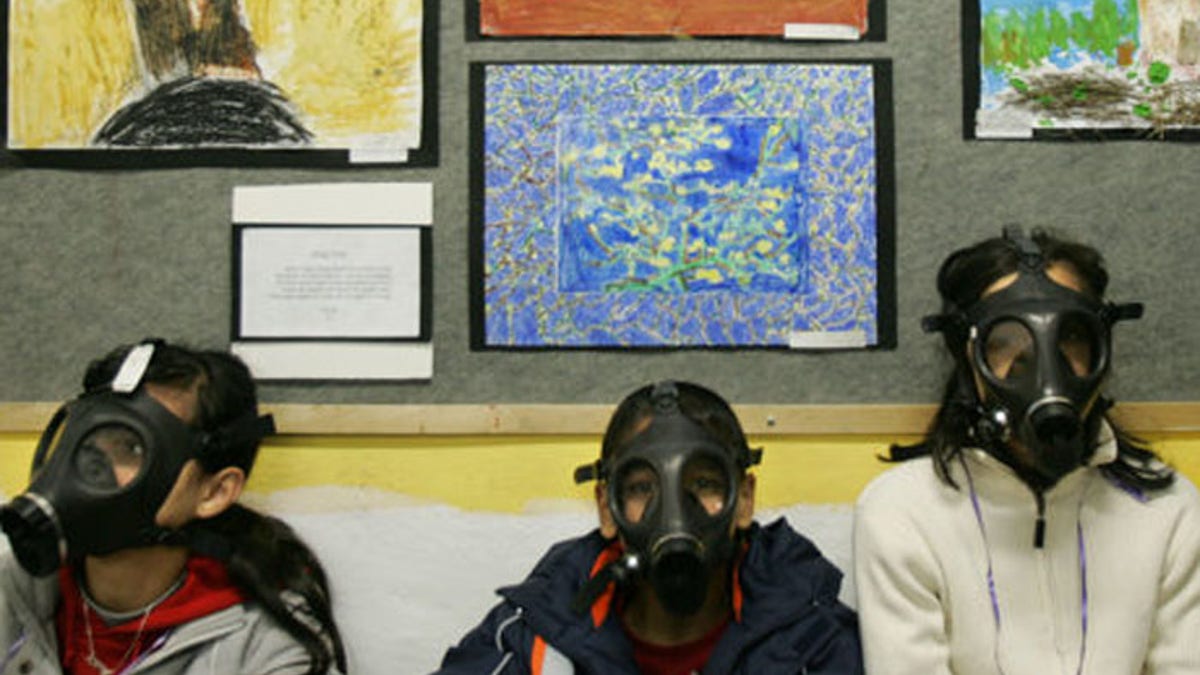
Schoolkids in Israel - and their teachers - are prepared for terror. (AP)
JERUSALEM – Americans intent on ensuring a school massacre like the one in Newtown, Conn., never happens again could learn a lot from Israel, where the long menu of precautions includes armed teachers.
The Jewish state, which has long faced threats of terrorist strikes in crowded locations including schools, takes an all-of-the-above approach to safety in the classroom. Fences, metal detectors and armed private guards are part of a strategy overseen by the country’s national police. And the idea of armed teachers in the classroom, which stirred much controversy in the wake of the U.S. attack, has long been in practice in Israel, though a minority of them carry weapons today.
Oren Shemtov, CEO of Israel’s Academy of Security and Investigation, noted that attacks typically happen in a matter of minutes, and said gun-toting teachers could, at the very least, buy time for kids to escape while police race to the scene.
“Two (armed) teachers would have kept (the Newtown shooter) occupied for 45 seconds each,” said Shemtov, who is one of 16 people in Israel authorized to train those who instruct school guards.
Shemtov, a veteran of Israel’s security services who has been teaching security methods for 22 years, praised the Newtown teachers who gave their lives trying to protect children, but lamented the fact that they weren’t able to shoot back when gunman Adam Lanza opened fire, killing 20 children and six adults before shooting himself in the head as police converged on Sand Hook Elementary School.
“We need to give them the tools to be heroes,” Shemtov said. “No one wants to be a hero. They did what they had to do.”
Security consultant Dov Zwerling, an Israeli counter-terror police veteran, believes armed guards are crucial for school security.
“From what I know of almost all of the active shooter events in the U.S., almost all of them conclude with the shooter taking his own life the moment he is challenged by the first officer on the scene,” Zwerling said. “Why not challenge him earlier?”
Shemtov said the two most critical keys to protecting schools are armed guards and armed teacher response teams. But, as in the U.S., the idea of teachers carrying guns raised some objections in Israel, he said.
“At one point the Interior Ministry mandated that a certain percentage of teachers be armed but because, over time, fewer teachers carried weapons, for a number of reasons, including philosophical objections, and due to increased terror attacks, private guards were mandated at all schools," he said.
School security in Israel is an extension of the comprehensive approach authorities there take to protecting all public places. According to National Police spokesman Micky Rosenfeld, police work with the Israeli Defense Force and the private security companies that protect such places as malls, bus stations, schools and universities. A centralized command system allows for quick dissemination of intelligence to every police officer and private guard in the field, he said.
A collective effort among police, private guards and teachers requires that the civilians involved in armed security receive rigorous training. Private guards undergo at least three weeks of advanced training with a 9mm weapon and guards employed for school protection must pass criminal, mental and physical checks.
“A long course, at a minimum of 40-60 hours, is needed so that the instructor can feel out the student,” said Shemtov, noting that not all teachers or guards are suited for school protection. “Course candidates should be a certain age, emotionally mature, of a certain mentality, physically healthy - and from there move to training.”
In order to station armed guards in U.S. schools, an idea advocated by the National Rifle Association, America could tap a ready pool of qualified candidates, Shemtov said. U.S. soldiers returning from overseas are well suited for school protection, he said, and “instead of returning with nothing to do there’s a sea of work” as school guards.
“They’re the elite of the American people,” Shemtov said. “You have people obligated, morally and ethically to the state, to the flag - this is a soldier. It’s a person who went out to do this. All you have to do is give him the appropriate training to do this in the private sector....This is the best of the American people, like they’re the best of the Israeli people. They’re people who took it upon themselves to help others.”
Greg Tepper is a freelance journalist based in Jerusalem








































